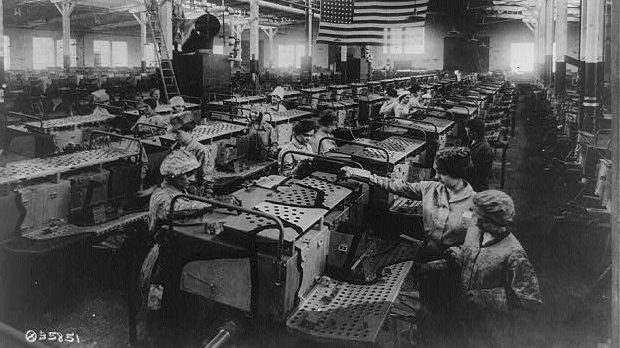Black Labor Has Built America Through Centuries
The story of American capitalism is one that, according to Carnegie Mellon Professor and Author Joe Trotter, showcases the persistent struggle against inequality faced by African Americans.

A Detroit Factory circa 1914-1918. Photo credit: Library of Congress.
In the ongoing reckoning over race in America, many of the conversations in this moment are forward-focused. While striving for a more equitable future is imperative, can we really move forward without a comprehensive understanding of the history that got us to this moment? Detroit Today host Stephen Henderson spends the hour looking back at the role of African-Americans in the making of America, specifically through the lens of Black American labor.
Listen: Labor history scholar and author Joe Trotter explains the interconnectivity between Black labor, capitalism and the creation of America
Guest:
Joe Trotter Jr. is the Giant Eagle Professor of History and Social Justice at Carnegie Mellon University. He is also the Director and Founder of Carnegie Mellon’s Center for Africanamerican Urban Studies and the Economy (CAUSE). His latest book is titled “Workers on Arrival: Black Labor in the Making of America.” As far as the origins of this book and why Trotter decided that 2019 was the right time for this effort, Trotter explains that he wanted to commemorate that 2019, “represented 400 years since the landing of African people in Jamestown, it was the symbolic beginnings of African American life in North America.” Trotter explains that contrary to the prevailing beliefs about the disparities in manual unpaid labor falling across racial lines, this isn’t entirely true. “The first enslaved African people were part of a labor system that also included white indentured servants… but by late 1600s early 1700s [that changed].”
As time passed and America found its financial footing as a nation, Trotter says that Black labor was integral to the nation’s economy in several ways. He points out that, while primarily African American labor fueled capitalist development through cotton, enslaved Africans also cultivated rice, sugar and tobacco. Crops weren’t the only source of economic gains from African Americans though. Totter explains that the enslaved people themselves were a profitable commodity. “Black people were a commodity to be bought and sold for profit, the slave-trading network was another way profits were generated… and reinforced American capitalism.” Despite these monumental and centuries-long atrocities, Trotter emphasizes that “African Americans employed creativity,” to continue to move forward and maintain hope in the midst of monumental challenges and barriers.
Trusted, accurate, up-to-date
WDET is here to keep you informed on essential information, news and resources related to COVID-19.
This is a stressful, insecure time for many. So it’s more important than ever for you, our listeners and readers, who are able to donate to keep supporting WDET’s mission. Please make a gift today.
